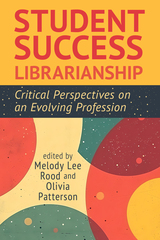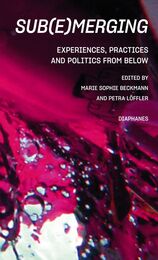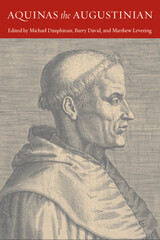
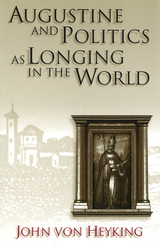
Saint Augustine's political thought has usually been interpreted by modern readers as suggesting that politics is based on sin. In Augustine and Politics as Longing in the World, John von Heyking shows that Augustine actually considered political life a substantive good that fulfills a human longing for a kind of wholeness.
Rather than showing Augustine as supporting the Christian church's domination of politics, von Heyking argues that he held a subtler view of the relationship between religion and politics, one that preserves the independence of political life. And while many see his politics as based on a natural-law ethic or on one in which authority is conferred by direct revelation, von Heyking shows how Augustine held to an understanding of political ethics that emphasizes practical wisdom and judgment in a mode that resembles Aristotle rather than Machiavelli.
Augustine and Politics as Longing in the World demonstrates some of the deficiencies in the way Augustine's political thought has been interpreted. It also explains why a rereading of his thought illuminates the current debates between "secularists" and proponents of "orthodoxy" and shows why these debates are miscast. By examining Augustine's political thought, von Heyking provides a way of resolving this controversy and shows how we can move beyond conflicting claims and thus moderate yet elevate political life.
Behind Augustine's apparent antipolitical rhetoric lies his substantial agreement with his Roman philosophical interlocutors on virtue and politics. This allegedly antipolitical rhetoric is meant to tame the lust for domination of Roman patriots by showing that lust can never be satisfied by political goods. By opposing extreme "worldliness" with extreme "otherworldliness," Augustine appears to reject politics as a natural good. On the contrary, he affirmed politics as a natural good.
Augustine and Politics as Longing in the World shows how Augustine's belief that politics was a way for humans to fulfill their longings for a kind of wholeness discloses a deeper affirmation of a more meaningful, pluralistic, and robust political life than his interpreters have previously appreciated.
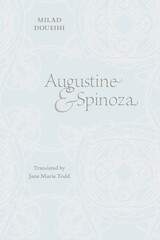
Election and grace are two key concepts that not only have shaped the relations between Judaism and Christianity, but also have formed a cornerstone of the Western philosophical discourse on the evolution and progress of humanity. Though Augustine and Spinoza can be shown to share a methodological approach to these concepts, their conclusions remain radically different. For the Church Father Augustine, grace defines human nature by the potential availability of divine intervention, thus setting the stage for the institutional and political legitimacy of the Church, the Christian state, and its justice. For Spinoza, on the other hand, election represents a unique but local form of divine intervention, marked by geography and historical context.
Milad Doueihi maps out the consequences of such an encounter between these two thinkers in terms of their philosophical heritage and its continued relevance for contemporary discussions of religious diversity and autonomy.
Augustine asserts a theological foundation for the political, whereas Spinoza radically separates philosophy, and thus authority, from theology in order to solicit a political democracy. In this sharply argued and deeply learned book, Milad Doueihi shows us how interconnections between the two thinkers have come to shape Western philosophy.
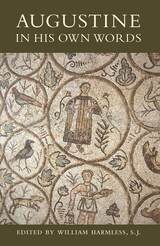
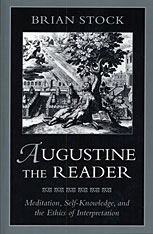
Augustine of Hippo, a central figure in the history of Western thought, is also the author of a theory of reading that has had a profound influence on Western letters from the ages of Petrarch, Montaigne, Luther, and Rousseau to those of Freud and our own time. Brian Stock provides the first full account of this theory within the evolution of Augustine’s early dialogues, his Confessions, and his systematic treatises.
Augustine was convinced that words and images play a mediating role in our perceptions of reality. In the union of philosophy, psychology, and literary insights that forms the basis of his theory of reading, the reader emerges as the dominant model of the reflective self. Meditative reading, indeed the meditative act that constitutes reading itself, becomes the portal to inner being. At the same time, Augustine argues that the self-knowledge reading brings is, of necessity, limited, since it is faith rather than interpretive reason that can translate reading into forms of understanding.
In making his theory of reading a central concern, Augustine rethinks ancient doctrines about images, memory, emotion, and cognition. In judging what readers gain and do not gain from the sensory and mental understanding of texts, he takes up questions that have reappeared in contemporary thinking. He prefigures, and in a way he teaches us to recognize, our own preoccupations with the phenomenology of reading, the hermeneutics of tradition, and the ethics of interpretation.
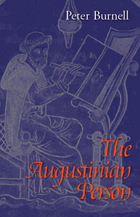
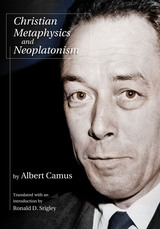
Contemporary scholarship tends to view Albert Camus as a modern, but he himself was conscious of the past and called the transition from Hellenism to Christianity “the true and only turning point in history.” For Camus, modernity was not fully comprehensible without an examination of the aspirations that were first articulated in antiquity and that later received their clearest expression in Christianity. These aspirations amounted to a fundamental reorientation of human life in politics, religion, science, and philosophy.
Understanding the nature and achievement of that reorientation became the central task of Christian Metaphysics and Neoplatonism. Primarily known through its inclusion in a French omnibus edition, ithas remained one of Camus’ least-read works, yet it marks his first attempt to understand the relationship between Greek philosophy and Christianity as he charted the movement from the Gospels through Gnosticism and Plotinus to what he calls Augustine’s “second revelation” of the Christian faith.
Ronald Srigley’s translation of this seminal document helps illuminate these aspects of Camus’ work. His freestanding English edition exposes readers to an important part of Camus’ thought that is often overlooked by those concerned primarily with the book’s literary value and supersedes the extant McBride translation by retaining a greater degree of literalness.
Srigley has fully annotated Christian Metaphysics to include nearly all of Camus’ original citations and has tracked down many poorly identified sources. When Camus cites an ancient primary source, whether in French translation or in the original language, Srigley substitutes a standard English translation in the interest of making his edition accessible to a wider range of readers. His introduction places the text in the context of Camus’ better-known later work, explicating its relationship to those mature writings and exploring how its themes were reworked in subsequent books.
Arguing that Camus was one of the great critics of modernity through his attempt to disentangle the Greeks from the Christians, Srigley clearly demonstrates the place of Christian Metaphysics in Camus’ oeuvre. As the only stand-alone English version of this important work—and a long-overdue critical edition—his fluent translation is an essential benchmark in our understanding of Camus and his place in modern thought.
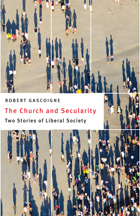
Western liberal societies are characterized by two stories: a positive story of freedom of conscience and the recognition of community and human rights, and a negative story of unrestrained freedom that leads to self-centeredness, vacuity, and the destructive compromise of human values. Can the Catholic Church play a more meaningful role in assisting liberal societies in telling their better story?
Australian ethicist Robert Gascoigne thinks it can. In The Church and Secularity he considers the meaning of secularity as a shared space for all citizens and asks how the Church can contribute to a sensitivity to—and respect for—human dignity and human rights. Drawing on Augustine’s City of God and Vatican II’s Gaudium et spes, Gascoigne interprets the meaning of freedom in liberal societies through the lens of Augustine’s “two loves,” the love of God and neighbor and the love of self, and reveals how the two are connected to our contemporary experience.
The Church and Secularity argues that the Church can serve liberal societies in a positive way and that its own social identity, rooted in Eucharistic communities, must be bound up with the struggle for human rights and resistance to the commodification of the human in all its forms.
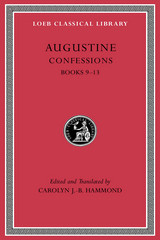
The classic account of crisis and conversion.
Aurelius Augustine (AD 354–430), one of the most important figures in the development of western Christianity and philosophy, was the son of a pagan, Patricius of Tagaste, and his Christian wife, Monnica. While studying to become a rhetorician, he plunged into a turmoil of philosophical and psychological doubts, leading him to Manichaeism. In 383 he moved to Rome and then Milan to teach rhetoric. Despite exploring classical philosophical systems, especially skepticism and Neoplatonism, his studies of Paul’s letters with his friend Alypius, and the preaching of Bishop Ambrose, led in 386 to his momentous conversion from mixed beliefs to Christianity. He soon returned to Tagaste and founded a religious community, and in 395 or 396 became bishop of Hippo.
Confessions, composed ca. 397, is a spiritual autobiography of Augustine’s early life, family, personal and intellectual associations, and explorations of alternative religious and theological viewpoints as he moved toward his conversion. Cast as a prayer addressed to God, though always conscious of its readers, Confessions offers a gripping personal story and a philosophical exploration destined to have broad and lasting impact, all delivered with Augustine’s characteristic brilliance as a stylist.
This edition replaces the earlier Loeb Confessions by William Watts.
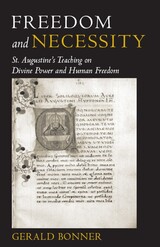

"Several books a year wrestle with that hoary conundrum, but few so dazzlingly as the Polish philosopher's latest."—Carlin Romano, Washington Post Book World
"Kolakowski's fascinating book and its debatable thesis raise intriguing historical and theological questions well worth pursuing."—Stephen J. Duffy, Theological Studies
"Kolakowski's elegant meditation is a masterpiece of cultural and religious criticism."—Henry Carrigan, Cleveland Plain Dealer
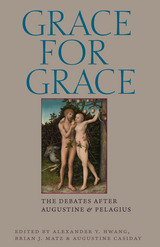
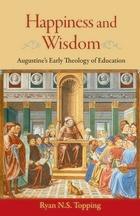
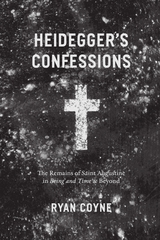
Coyne first examines the role of Augustine in Heidegger’s early period and the development of his magnum opus, Being and Time. He then goes on to show that Heidegger owed an abiding debt to Augustine even following his own rise as a secular philosopher, tracing his early encounters with theological texts through to his late thoughts and writings. Bringing a fresh and unexpected perspective to bear on Heidegger’s profoundly influential critique of modern metaphysics, Coyne traces a larger lineage between religious and theological discourse and continental philosophy.
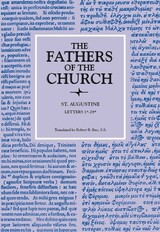
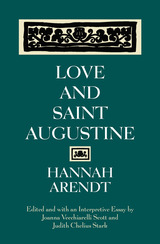
In Love and Saint Augustine, Joanna Vecchiarelli Scott and Judith Chelius Stark make this important early work accessible for the first time. Here is a completely corrected and revised English translation that incorporates Arendt's own substantial revisions and provides additional notes based on letters, contracts, and other documents as well as the recollections of Arendt's friends and colleagues during her later years.
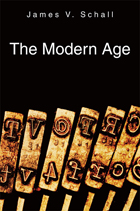
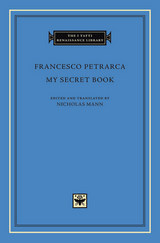
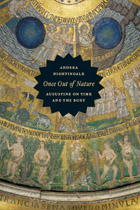
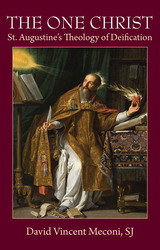
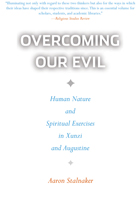
Can people ever really change? Do they ever become more ethical, and if so, how? Overcoming Our Evil focuses on the way ethical and religious commitments are conceived and nurtured through the methodical practices that Pierre Hadot has called "spiritual exercises." These practices engage thought, imagination, and sensibility, and have a significant ethical component, yet aim for a broader transformation of the whole personality. Going beyond recent philosophical and historical work that has focused on ancient Greco-Roman philosophy, Stalnaker broadens ethical inquiry into spiritual exercises by examining East Asian as well as classical Christian sources, and taking religious and seemingly "aesthetic" practices such as prayer, ritual, and music more seriously as objects of study.
More specifically, Overcoming Our Evil examines and compares the thought and practice of the early Christian Augustine of Hippo, and the early Confucian Xunzi. Both have sophisticated and insightful accounts of spiritual exercises, and both make such ethical work central to their religious thought and practice. Yet to understand the two thinkers' recommendations for cultivating virtue we must first understand some important differences. Here Stalnaker disentangles the competing aspects of Augustine and Xunxi's ideas of "human nature." His groundbreaking comparison of their ethical vocabularies also drives a substantive analysis of fundamental issues in moral psychology, especially regarding emotion and the complex idea of "the will," to examine how our dispositions to feel, think, and act might be slowly transformed over time. The comparison meticulously constructs vivid portraits of both thinkers demonstrating where they connect and where they diverge, making the case that both have been misunderstood and misinterpreted. In throwing light on these seemingly disparate ancient figures in unexpected ways, Stalnaker redirects recent debate regarding practices of personal formation, and more clearly exposes the intellectual and political issues involved in the retrieval of "classic" ethical sources in diverse contemporary societies, illuminating a path toward a contemporary understanding of difference.
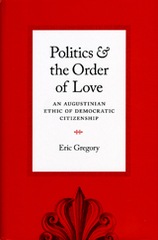
Gregory examines a broad range of Augustine’s texts and their reception in different disciplines and identifies two classical themes which have analogues in secular political theory: love—and related notions of care, solidarity, and sympathy—and sin—as well as related notions of cruelty, evil, and narrow self-interest. From an Augustinian point of view, Gregory argues, love and sin constrain each other in ways that yield a distinctive vision of the limits and possibilities of politics.
In providing a constructive argument for Christian participation in liberal democratic societies, Gregory advances efforts to revive a political theology in which love’s relation to justice is prominent. Politics and the Order of Love will provoke new conversations for those interested in Christian ethics, moral psychology, and the role of religion in a liberal society.
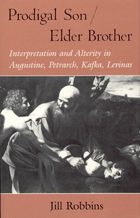
"Through a creative reading of the prodigal son parable, Jill Robbins demonstrates the hermeneutical impasse of the Christian exegete who must and yet cannot incorporate the Old Testament. Having disclosed the aporia at the heart of Christian hermeneutics, she proposes an alternative approach to the Hebrew Bible and new interpretations of Augustine, Petrarch, Kafka, and Levinas. Robbins brilliantly integrates the discourses of biblical texts, literary works, and critical analysis."—Mark C. Taylor, Williams College
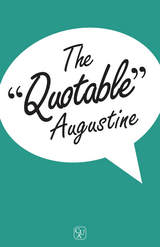
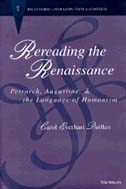
Carol Quillen argues that the essential role of Augustine's words and authority in the expression of Petrarch's humanism is best grasped through a study of the complex textual practices exemplified in the writings of both men. Petrarch's reliance on Augustine is most evident in his ways of reading and in his strategies of argument. Secondly, she maintains that Petrarch's appropriation of Augustine's words is only intelligible in light of his struggle to legitimate his cultural ideals in the face of compelling opposition. Finally, Quillen shows how Petrarch's uses of Augustine can simultaneously uphold his humanist ideals and challenge the legitimacy of the assumptions on which those ideals were founded.
Interdisciplinary in scope and method, this volume speaks to important debates that span the humanities. Scholars of literary and historical studies, as well as those in the fields of classical studies, patristics, and comparative literature, will find in Rereading the Renaissance a solid contribution to their interests.
Carol Everhart Quillen is Associate Professor of History, Rice University.
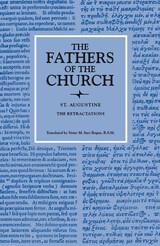
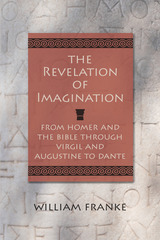
In The Revelation of Imagination, William Franke attempts to focus on what is enduring and perennial rather than on what is accommodated to the agenda of the moment. Franke’s book offers re-actualized readings of representative texts from the Bible, Homer, and Virgil to Augustine and Dante. The selections are linked together in such a way as to propose a general interpretation of knowledge. They emphasize, moreover, a way of articulating the connection of humanities knowledge with what may, in various senses, be called divine revelation. This includes the sort of inspiration to which poets since Homer have typically laid claim, as well as that proper to the biblical tradition of revealed religion. The Revelation of Imagination invigorates the ongoing discussion about the value of humanities as a source of enduring knowledge.
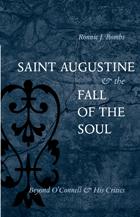
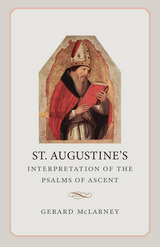
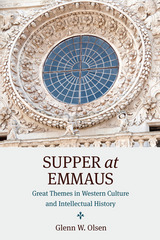
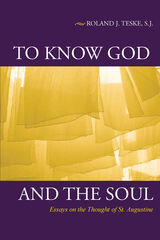
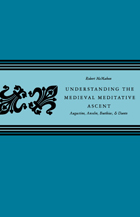
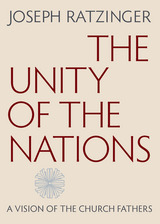
READERS
Browse our collection.
PUBLISHERS
See BiblioVault's publisher services.
STUDENT SERVICES
Files for college accessibility offices.
UChicago Accessibility Resources
home | accessibility | search | about | contact us
BiblioVault ® 2001 - 2025
The University of Chicago Press


